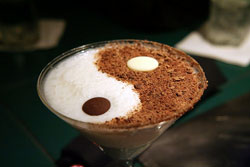|
Bartenders Guide: The Tao of Mixology
"It is not enough to conquer; one must learn to seduce." - Voltaire "Any fool can create an overwhelming drink, and most fools do." - Frost Oddly, although I've written a good twenty pages before it, Mixology was the reason I created this site. Recipes, recipes, recipes...everyone wants a recipe...and I have some good ones, definitely. And yes...I will share them with you, here and elsewhere in the site.* But here's the rub: I want you not to need them. It is not enough that you know what goes into a cocktail. Any monkey can follow a recipe. You must know *why*...and when you know why, you won't need a recipe. You will be able to trust your judgement and your palate, and you will know when you are right. An experienced bartender can examine a recipe and know without tasting it, whether the combination will be harmonious. That is the heart of Mixology. The classic recipes, the international cocktails known the world over, were almost all created on the spur of the moment, for a certain group of people, at a certain time, using whatever was on hand. Very rarely is anything good concocted from some little mad scientist blending away in a laboratory. The key, the secret, the Tao of Mixology...is this: Simplicity and Balance. You must, must, must know your ingredients. There is no substitute for this. I don't care if you are working at the Ritz Cognac Bar or the local College Shot & Beer joint. Taste everything you have and make a few notes. The better you know them, the better your finished work. It is better to know three rums intimately, with their base components and more elusive elements & spices, than it is to know twenty rums marginally. When you understand that Captain Morgan's, for example, has overtones of vanilla, cinnamon, fruit and licorice, you can use that knowledge to blend it with something as simple as Cream Soda, which is vanilla-based, and create something delicious. If you want to gently elevate another note, a dash of Goldschlager, Peach Schnapps or Sambuca will each yield entirely different and tasty results. This is a very simplistic example, but it illustrates the point...the addition of other ingredients must make something better than it would be, on its own. This is known as synergy. Simplicity: Everything should be there for a reason. If it does not add something distinct and necessary, it does not belong. The citrusy splash of Cointreau or Triple Sec in a Margarita makes it a better drink. The (however minute) dash of Vermouth in your Vodka Martini is what makes it a Martini. Without it, you have a big glass of chilled vodka, not a cocktail. Know what is necessary and remove everything else. The best cocktails are subtle and mysterious, accentuating flavors others might not have known were there. Never use a hatchet to accomplish what can be done with a scalpel. Balance: There are only two ways to achieve it...blending harmonious flavors that lend continuity to a drink...such as the rum, pineapple and coconut in a Pina Colada...or weighted opposites, such as the Whiskey Sour, in which the sour mix both contrasts and harmonizes with the Bourbon. Balance is a bartender's Highest Art, and Simplicity is his or her Guiding Principle. *If you must search for a recipe, do so on the Food Network or other reputable culinary website that kitchen tests their recipes. While there are some great bartenders willing to share their knowledge on the web, the vast majority of recipes posted on the internet are submitted by random amateurs. They are often BAD, and expensive to boot...because that's what amateurs do...buy a bunch of crap and stick it in a blender.
Quality ingredients are a must. If you are working at someone else's establishment, you may not have a say in this, but know the importance of it. Know what your cocktail is FOR...its purpose. Are you creating a fun party drink? An aperitif (before-dinner cocktail), something to revive from the night before, or take the chill off a weary traveler? Make the right drink at the right time. Most cocktails have three components: The Basis, or base flavor. The Modifier The Additive
|





